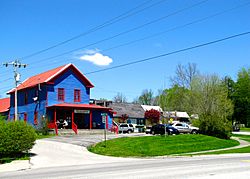Sewanee, Tennessee facts for kids
Quick facts for kids
Sewanee, Tennessee
|
|
|---|---|

Businesses along US 41A in Sewanee
|
|

Location of Sewanee, Tennessee
|
|
| Country | United States |
| State | Tennessee |
| County | Franklin |
| Area | |
| • Total | 3.91 sq mi (10.11 km2) |
| • Land | 3.89 sq mi (10.07 km2) |
| • Water | 0.02 sq mi (0.05 km2) |
| Elevation | 1,929 ft (588 m) |
| Population
(2020)
|
|
| • Total | 2,535 |
| • Density | 652.34/sq mi (251.85/km2) |
| Time zone | UTC-6 (Central (CST)) |
| • Summer (DST) | UTC-5 (CDT) |
| ZIP codes |
37375, 37383
|
| Area code(s) | 931 |
| FIPS code | 47-67140 |
| GNIS feature ID | 1301113 |
Sewanee (/səˈwɑːni/) is a small community in Franklin County, Tennessee, United States. It is known as a census-designated place (CDP), which is a special area defined for counting people. In 2020, about 2,535 people lived there. Sewanee is also part of the larger Tullahoma area.
Most people know Sewanee because it is home to The University of the South. This university is often just called "Sewanee" too.
Contents
Exploring Sewanee's Location
Sewanee is located on the western edge of the Cumberland Plateau. This is a high, flat area in the southeastern part of Middle Tennessee. The community sits at an elevation of about 1,929 feet (588 meters) above sea level.
Roads and Travel in Sewanee
The main road in Sewanee is a combination of U.S. Route 41A and Tennessee State Route 56. This road connects Sewanee to Monteagle in the east. Further west, these highways split. US 41A goes down the plateau towards Cowan and Winchester. State Route 56 goes south down the plateau towards Sherwood and Alabama.
Understanding Sewanee's Layout
The campus of The University of the South takes up most of the northern part of Sewanee. There are also several small neighborhoods scattered around the campus. A small area with shops and businesses is found where US 41A meets University Avenue. University Avenue is a wide road that leads from the highway to the university campus.
The total area of Sewanee is about 3.9 square miles (10.1 square kilometers). Most of this area is land, with a very small part (about 0.02 square miles or 0.05 square kilometers) being water.
Sewanee's Climate
Sewanee has a climate with fairly warm temperatures and rain spread out throughout the year. This type of weather is called a "Humid Subtropical Climate." It means the area has hot, humid summers and mild winters.
Who Lives in Sewanee?
| Historical population | |||
|---|---|---|---|
| Census | Pop. | %± | |
| 2000 | 2,361 | — | |
| 2010 | 2,311 | −2.1% | |
| 2020 | 2,535 | 9.7% | |
| U.S. Decennial Census | |||
The population of Sewanee has changed over the years. In 2000, there were 2,361 people. By 2010, the number was 2,311. In the most recent count in 2020, the population grew to 2,535 people.
People of Sewanee in 2020
In 2020, there were 2,535 people living in Sewanee. These people lived in 469 households, and 249 of these were families.
| Group | Number of People | Percentage |
|---|---|---|
| White (not Hispanic) | 2,095 | 82.64% |
| Black or African American (not Hispanic) | 118 | 4.62% |
| Native American | 2 | 0.08% |
| Asian | 71 | 2.8% |
| Other/Mixed | 162 | 6.39% |
| Hispanic or Latino | 88 | 3.47% |
Healthcare in Sewanee
Sewanee has one hospital called Southern Tennessee Regional Health Care - Sewanee. It used to be known as Emerald-Hodgson Hospital.
Education and Culture in Sewanee
Sewanee is a center for learning and culture. It is home to several important educational institutions and hosts cultural events.
The University of the South
The most famous institution in Sewanee is The University of the South. This university was founded and is owned by the southern dioceses of the Episcopal Church. It is often simply called "Sewanee."
Local Schools
- Sewanee Elementary School serves the children of Sewanee and nearby communities.
- St. Andrew's-Sewanee School is a private school for students in grades 6 through 12. It is one of the oldest boarding and day schools in the Southern United States. It has about 100 students who live at the school and 150 students who attend during the day.
Cultural Events and Publications
- The Sewanee Writers' Conference takes place every summer at the university. This event brings writers together.
- The Sewanee Summer Music Festival is a month-long music camp held each year. Young musicians who play orchestral instruments come to learn from experienced teachers and conductors.
- The Sewanee Review is a literary magazine that has been published continuously in Sewanee since 1892. It is one of the oldest literary magazines in the United States.
The Templeton Library Building
The Templeton Library building is a well-known landmark in Sewanee. It sits high on a bluff, looking out over the valley below. This building was originally meant to hold the important papers of financier Sir John Templeton, who was from this area. Today, it is no longer a library but has been changed into several private apartments.
See also
 In Spanish: Sewanee para niños
In Spanish: Sewanee para niños

